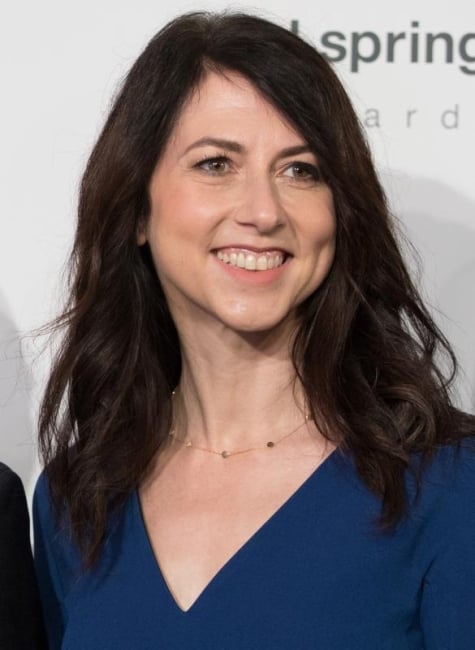You have /5 articles left.
Sign up for a free account or log in.

MacKenzie Scott
picture alliance/Getty Images
Twice in 2020 and once in 2021 the billionaire philanthropist MacKenzie Scott surprised colleges unaccustomed to multimillion-dollar gifts—among them community colleges, tribal colleges and historically Black colleges and universities—with bigger gifts than they’ve ever gotten. Five million dollars for this college, $30 million for that one, up to $50 million in unrestricted dollars for university leaders to use as they saw fit.
“I think her funding shined a light on those organizations that don’t always stand out,” said Heidi M. Anderson, president of the University of Maryland, Eastern Shore, an HBCU that received a $20 million gift from Scott. The Scott gift helped UMES more than double the value of its endowment, from about $30 million in October 2020 to $61 million today, and the university expects to draw up to $1.7 million in income from the endowment this spring to use for student scholarships and faculty development and to build up its sponsored research operation.
“Like many organizations, our organization had never received a gift this large,” Anderson said. “I felt it was really incumbent upon me and the university to use the resources prudently and use them in a way that could sustain the university.”
In announcing many of the gifts, Scott—who also gave to a number of other higher education and scholarship-granting nonprofit organizations—said she was accelerating her giving in response to the crisis wrought by the COVID-19 pandemic. She said she asked her advisers to identify organizations “with strong leadership teams and results, with special attention to those operating in communities facing high projected food insecurity, high measures of racial inequity, high local poverty rates, and low access to philanthropic capital.”
Colleges are using the gifts in a variety of ways. Fernando Delgado, president of Lehman College, a City University of New York institution in the Bronx, said the college transferred $26 million of the $30 million gift into the endowment—which before that had a value of about $6 million—to fund long-term priorities, including scholarships. A new MacKenzie Scott Opportunity Scholarship Fund, set to launch this year, is expected to yield an estimated $400,000 per year in new funding for scholarships. (Editor's note: The amount of money transferred into Lehman College's endowment has been changed based on updated information provided by the college.)
Delgado said the college is using the balance of the gift to fund a variety of short-term priorities, including commissioning a campus climate study, developing new mentoring and career training programs, and contracting with a consulting firm focused on fundraising and development to build the college’s fundraising infrastructure and multiply the impact of Scott’s gift.
“It just resets the space,” Delgado said. “We got a $30 million gift, so now we can legitimately talk aspirationally about a $100 or $125 million campaign.”
Several college officials said they believed Scott’s decision to help their institutions had helped attract other large gifts. A spokeswoman for Tougaloo College, a private historically Black college in Mississippi, said the college “garnered numerous unexpected by-products from private donors” as a result of Scott’s gift, including $2.75 million for scholarships from anonymous donors, a $1 million gift from TikTok for scholarships for students pursuing health-care careers, and a $1 million gift from Gilead Sciences to support social justice programming and student support.
California State University, Fullerton, leaders opted to use $11 million of the $40 million gift from Scott for a matching program to inspire other donors.
“Basically what we told our donors is for gifts above a certain size for endowment or capital projects, that they’ll be matched at 50 percent. So, for example, if you gave $100,000 today for an endowment, it would immediately become $150,000,” said Greg Saks, Cal State Fullerton’s vice president for advancement (the university has capped the amount of the match at $1 million for any one gift or pledge).
“It’s been really embraced by our donor community,” said Saks. “I think it’s motivated some donors to give in certain ways, and it’s created some urgency. Its first-come, first-serve.”
The gifts have also had major impacts on tribal colleges. Donna Brown, the president of Turtle Mountain Community College in North Dakota, said the $8 million gift the college received was the largest ever, “by millions. We’ve never even received a million-dollar donation in the past, so it’s significantly higher than anything we’ve ever received.”
“There are a couple ways that we spent some of the money but it’s really only a drop in the bucket,” Brown said. “One way is we’re developing a recording studio and some portable recording equipment to digitize the two languages that we have on the reservation, and those would be Ojibwe and Michif. There are few native speakers left, so a lot of video and audio is being recorded and we’re doing it as professionally as we can so they last throughout the years.”
Brown said the college is also using some of the donation money to offer tuition assistance to faculty and staff members to enroll in advanced degree programs online.
“We want the MacKenzie Scott funds to be sustainable and to take the college into the future,” Brown said. “We are a two-year college, so most of our faculty are only required to have a bachelor’s degree. We’re hoping that many of them will continue to pursue master’s and doctorates so we can offer more four-year programs.”
Brown said the college is also using funds from the Scott gift to hire Ph.D.-level faculty to teach in a new master’s program, the college’s first-ever graduate program, in Indigenous education, slated to start this fall pending approval from Turtle Mountain’s accreditor.
Blackfeet Community College, a tribal college in Montana, used the $3 million gift it received from Scott to establish its first-ever endowment. The college does not plan to make any withdrawals from the endowment for the first 10 years after its establishment.
“This endowment is a significant investment into the future of the Blackfeet people,” Karla Bird, the college’s president, said in a statement. “For as long as future leaders steward this endowment with great care, this investment may exist in perpetuity. The investment fund has the potential to secure our children and grandchildren’s futures and affirm our educational rights as a sovereign nation.”
James Palmer, provost and senior vice president for academic affairs at Prairie View A&M University, a historically Black university in Texas, said the university allocated about two-thirds of the $50 million gift it received from Scott to its endowment, bringing its value from about $95 to $130 million. “For an HBCU, that meant a huge endowment,” Palmer said.
Among other priorities, Prairie View has allocated $15 million of the endowed funds to faculty development and recruitment, with an aim of attracting top professors, and another $10 million into a new endowed scholarship fund aimed at attracting high-achieving students.
The university also allocated $17 million in funds for immediate use, including $10 million for student grants to respond to needs created by the pandemic—Palmer said that in fiscal year 2021, the university allocated $5.3 million to 4,046 students who benefited from the program—and $7 million toward a new engineering building.
“It’s really quite remarkable,” Palmer said. “It’s allowed us to do some things during the pandemic to help students stay in school, while also thinking of the long-term impact.”
Leah Barrett, president of Northeast Community College in Nebraska, said the college placed the entire $15 million gift from Scott in an endowment, with plans to use the proceeds to support scholarships as well as student services and initiatives focused on student success and career planning.
“Our plan is to use the proceeds, because that will generate between 4 and 6 percent in perpetuity for northeast Nebraska,” Barrett said. While she noted there “were no strings attached” to Scott’s gift, she expressed a desire to honor the intentionality of the donor by focusing on the socioeconomic mobility of the people of northeast Nebraska and said the college is seeking ways to support a population that has grown more diverse as refugees and individuals on temporary work visas have found their way to the heavily agricultural region.
“It’s question that we ask ourselves repeatedly—are we honoring this gift, are we ensuring it has the impact that the donor wants and that we want?” said Russell Lowery-Hart, president of Amarillo College, a rural college located in the Texas panhandle. “We’ve put the overwhelming majority of it, I think over $14 of the $15 million, in an endowment. We then use the funds for some immediate needs and then defined a community collaborative group to build out a plan for our entire community that these funds might best serve us long-term.”
Lowery-Hart said some of the immediate things Amarillo did with the money was to hire both an additional social worker and a mental health counselor. The college also hired faculty members to teach in brand-new career accelerator programs—10-week, full-time programs in cloud computing or coding.
The first cohorts just completed the programs.
“We paid a stipend to students while they were in those accelerators so that they could do them full-time,” Lowery-Hart said. “The appeal to them when we were focus grouping them was that it was accelerated, it was 10 weeks, it was something technological and gave them career options that didn’t require them to leave our community. They could live in Amarillo but work in a company in Dallas and San Francisco.”
Timothy Moore, president of Indian River State College in Florida, said he wants to use the $45 million gift from Scott quickly to make an immediate impact. His goal, he said, is to obligate the funds “essentially down to nothing by the end of the third or fourth year” to get “this massive wave of capital” out the door.
“If you look at Ms. Scott’s giving pledge, it was to create immediate impact for communities, minority populations, folks that have been harmed by the COVID pandemic,” Moore said. “What she was doing, in my estimation, and based on her own spoken word, she was trying to create a multiplier effect, put these dollars into play.”
Moore said the college plans to use the gift to make tuition free for residents of the college’s four-county service area, starting this fall. The college is also using funds from the Scott gift to double the size of its nursing program, invest in its childcare center, develop a student learning commons and expand a career pathways program that allows students from a specific Florida community to train for a credential tuition-free while receiving financial assistance toward the costs of transportation, meals and childcare.
Slightly more than 50 percent of Indian River College’s students are minorities, according to data provided by the college. About 40 percent receive a Pell Grant, federal financial aid for low-income students, and 37 percent are first-generation college students.
“These funds do no good if they sit in a bank account and draw interest,” said Moore. “I think her goals are clearly stated: use these dollars to change lives.”








